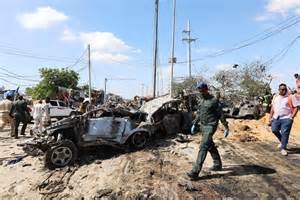The huge resources deployed to prop up Somalia’s central government are not being used where they are most needed in the fight against al Shabaab, says Horn of Africa expert Matthew Bryden, a day after Somalia’s deadliest attack in two years.
A massive car bomb exploded in a busy area of Mogadishu on Saturday, leaving at least 79 people dead and scores injured, with officials warning that the toll could rise further.
At least 16 of those killed were students from a local university, who had been travelling on a bus when the car bomb detonated at a busy intersection southwest of the Somali capital.
While the attack has not been claimed, experts said the car bombing bore all the hallmarks of past attacks by al Shabaab militants allied to al Qaeda.
“The fact that we haven’t seen a claim of responsibility from al Shabaab fits a historical pattern, where when a bomb goes off in the wrong place or kills lots of civilians they do not claim responsibility for the attack – even though they are most likely to have carried it out,” said Bryden, head of the Sahan Research think tank, in an interview with FRANCE 24.
Al Shabaab has been blamed for an October 2017 bombing in Mogadishu that killed 512 people, the country’s deadliest ever attack, though it never claimed responsibility.
Despite the help of a UN peacekeeping mission, and huge amounts of support from Western countries, Somalia’s federal government has failed to stamp out the Islamist insurgency – a failure Bryden blamed on conflicting priorities.
According to the analyst, resources that should be devoted to the fight against al Shabaab were being diverted by the government’s internal squabbles and efforts to assert its authority over regional administrations.
“Much of the army and the security establishment is deployed to impose control on allied governments within Somalia, and not deployed to fight al Shabaab – so the government’s attention is not focused on defeating the group that was probably behind this atrocity,” he said.
“All the resources are being absorbed in Mogadishu,” Bryden added. “We are really not seeing the kind of support needed out in the regions where the fight against al Shabaab is taking place.”
The militant group emerged from the Islamic Courts Union that once controlled central and southern Somalia and is variously estimated to number between 5,000 and 9,000 men.
Its forces have lost control of the capital and other cities, but they retain control of large rural swathes of the country and continue to wage a guerrilla war against the authorities, managing to inflict bloody death tolls in attacks at home and abroad.
“Basically, most of southern Somalia is a governance vacuum, and although al Shabaab doesn’t actually control that territory it has free rein to move and operate there,” Bryden explained.
“It also has a presence in major towns, including the capital Mogadishu, that are nominally controlled by the government, where it acts as a shadow government, collecting taxes and dispensing justice,” he added.






























